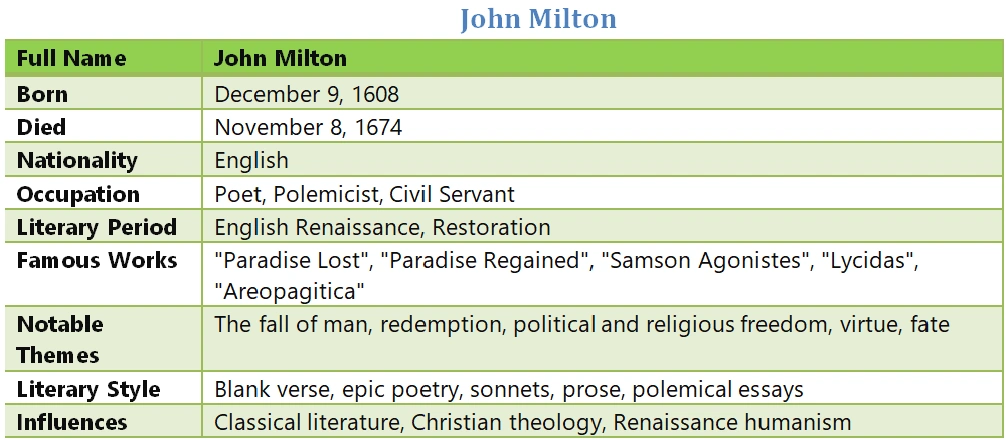35
Score: 0
Attempted: 0/35
Subscribe


John Milton Basic info
| Full Name | John Milton |
| Born | December 9, 1608 |
| Died | November 8, 1674 |
| Nationality | English |
| Occupation | Poet, Polemicist, Civil Servant |
| Literary Period | English Renaissance, Restoration |
| Famous Works | “Paradise Lost”, “Paradise Regained”, “Samson Agonistes”, “Lycidas”, “Areopagitica” |
| Notable Themes | The fall of man, redemption, political and religious freedom, virtue, fate |
| Literary Style | Blank verse, epic poetry, sonnets, prose, polemical essays |
| Influences | Classical literature, Christian theology, Renaissance humanism |
John Milton books names
| L’Allegro and Il Penseroso | 1645 |
| Comus | 1634 |
| Lycidas | 1638 |
| Poems | 1645 |
| Paradise Lost | 1667 |
| Paradise Regained | 1671 |
| Samson Agonistes | 1671 |
| Areopagitica | 1644 |
| The Doctrine and Discipline of Divorce | 1643 |
| The Tenure of Kings and Magistrates | 1649 |
| A Defence of the People of England | 1651 |
MCQs & Summary of Some Famous Poems by John Milton
- Paradise Lost MCQs & Summary
- Paradise Regained MCQs & Summary
- Lycidas MCQs & Summary
- On His Blindness MCQs & Summary
- On Shakespeare MCQs & Summary
- On the Morning of Christ’s Nativity MCQs & Summary
- L’Allegro MCQs & Summary
- Il Penseroso MCQs & Summary
- Samson Agonistes MCQs & Summary
- Areopagitica MCQs & Summary
- Comus MCQs & Summary
- How Soon Hath Time MCQs & Summary
Famous English Authors MCQs
- William Wordsworth MCQs
- William Shakespeare MCQs
- Robert Browning MCQs
- W B Yeats MCQs
- Edmund Spenser MCQs
- Chaucer MCQs
- John Milton MCQs
- S T Coleridge MCQs
- Lord Byron MCQs
- PB Shelley MCQs
- John Dryden MCQs
- John Keats MCQs
- Charles Dicken MCQs
- Alfred Lord Tennyson MCQs
- Charles Lamb MCQs
- D.H Lawrence MCQs
- Thomas Hardy MCQs
- Matthew Arnold MCQs
- John Galsworthy MCQs
- George Bernard Shaw MCQs
- T.S Eliot MCQs
- Ben Jonson MCQs
- Francis Bacon MCQs
- Alexander Pope MCQs
- Oliver Goldsmith MCQs
- Joseph Addison MCQs
- Dr Samuel Johnson MCQs
- Henry Fielding MCQs
- Sir Walter Scott MCQs
- Jane Austen MCQs
- Dr. Samuel Johnson MCQs
- English Comedy MCQs (Oliver Goldsmith)
- Alexander Pope MCQs (Neo-Classical Age of English Poetry)
- Daniel Defoe MCQs
- Dr. Jonathan Swift MCQs
- Richard Steele MCQs
- English Drama MCQs
- Elizabethan Drama MCQs [14th to 17th century]
- Elizabethan Prose MCQs
More English Literature MCQs
- English Poetry MCQs
- History of English Literature MCQs
- Sentimental Novels MCQs
- Sentimental Poetry MCQs
- Legends Of English Literature MCQs
- English Literature Quiz
- English Literature Important Multiple Choice Questions Answers
- Sons And Lovers by D H Lawrence MCQs
- The Waste Land, A Poem by T. S. Eliot MCQs
- Drama Origin MCQs
- History of the Renaissance Period MCQs
- English Pros MCQs
- Non-Dramtic Poets Of The Elizabethan Age MCQs
- The Cavalier Poets of 17th-century MCQs
- Metaphysical Poets of 17th century MCQs
- Renaissance Period of 14th, 15th, and 16th centuries MCQs
- Puritan Poet MCQs
- Restoration Comedy by William Congreve & Wycherley MCQs
- Satire MCQs – Renaissance Period by John Dryden
- English Essayists MCQs
- Romantic Period of Romantic Poets MCQs
- English language MCQs
- English Humour MCQs [American Literature]
- Early Writers of American Literature MCQs
- History of American Literature MCQs
- American Prose MCQs [English Realism ]
- American English Critics
- New Englanders Authors MCQs
- MCQs on American Literature After Independence
- American Playwrights MCQs
- New American Poetry MCQs
- British English Critics MCQs
- Ancient English literature MCQs
- Important English Literature MCQs for Public Service Commission
- English Literature Repeated Important MCQs
- CSS English Literature MCQs
- History of Early Period MCQs
- The Anglo-Saxon period MCQs
- The Age of Chaucer in the Early Period MCQs
- The Anglo-Norman Period of French Writers MCQs
- Metrical Romances MCQ (Anglo-Saxon Period)
- Revival of Learning MCQs (1400-1550)
- Applied Linguistics MCQs
- Language Change MCQs